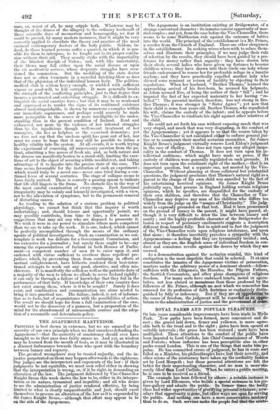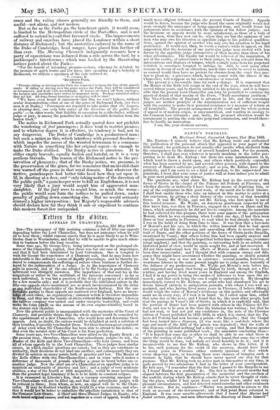ROYAL PARKS AND POPULAR PLEASURES.
OF late years considerable improvements have been made in Hyde Park. New paths have been formed, more coaveuient ancl di- rect ; the gravel laid down, firmer and yellower, is more agree- able both to the tread and. to the sight ; gates have been opened at suitable intervals ; the grass has been restored ; seats have been multiplied. These attentions to the comfort of the public have been imputed to Lord Gulisle; late Chief Commissioner of Woods and Forests ; whose influence has been perceptible also in other parks round London. This is one of the things that make him po- pular. He has committed errors of judgment, he has in some sort failed as a Minister, his philanthropies have lost their novelty, and other scions of the aristocracy have taken up the cordiality fishion set by Lord Morpeth ; but these personal attentions are felt the better for their unpretending character, and no man is more 'sin- cerely liked than Lord Carlisle. When he entereiektiblie meeting, he is sure to be received as a . .., The example has been followed hy,.41Itiitei!1.11. e4tattteleetatiee is giventld:1, Lord Ellesmere, who.WIU. a special antraneaito his pic- tun, ery and admits the publics -In fernier films the lordly class d wider opportunities of tot ?.,; 1g peraonal retainers; now- adays that opportunity is gene,.1)iit'n4; er ways are open for serving the public. .d nothing can hive a more conservative tendency than to do so. Such services make the people feel that the aristo- Irsaehand. the ruling classes generally are friendly to them, and —not aliens, and not useless. But so far as the Parks go, the beneficent spirit, it would seem, is limited to the Metropolitan circle of the Post-office, and is not suffered to extend beyond that favoured circle. The improvements of railway and omnibus have placed the Londoner within a short distance of Richmond ; but the austerities enforced in the name of the Duke of Cambridge, head ranger, have placed him further off than ever. - The Morning Chronicle indignantly recounts how a party of equestrians was debarred from a ride across the turf, by a parkkeeper's interference ; which was backed by the threatening notices posted about the Park— "For the benefit of intending pleasure-seekers, who may be deluded, by the promise of quick trains and low fares, into spending a day's holyday at Richmond, we subjoin a specimen of the code referred to.
V. (crown) R.
'RICHMOND PARK.
Noricz.
' Persons riding or driving in the Park are requested to keep the line of the gravel- roads. If riding or driving over the grass across the Park, they will be considered as trespassers, and dealt with accordingly. If horses are taken off from carriages, the keepers and constables have orders to impound them. No dogs admitted unless
they are led.veAeRvdeongsbfeaoutnvii ihtu will sichowt,.: t believe, without °cult& demonstration—that at one of the gates of Richmond Park, Ove hare seen it at Bushy,) Passengers are required to take notice that the keepers, in shooting deer, can only take notice of the direction of the public foot-
paths' other words, that liability to execution by a rifle-bullet, without judge or jury, is among the penalties for a hair's-breadth deviation from the beaten track.'
The notice in Richmond Park actually quoted does not prohibit
the wandering of foot passengers ; it does tend to restrict picnics ; and to whatever degree it is effective, its tendency is bad, not to say dangerous. The Duke of Cambridge is a goodnatured man; but such a notice, as this, which interferes with personal freedom— which impedes'the access of the wearied townsman to a commune with Nature in something like her original aspect—is enough to Make the Duke disliked. The Bushy notice is atrocious. It is either empty bravado, equally foolish and hateful, or it is a very perilous bravado. The reason of the Richmond notice is the pre- servation of pheasants ; that of the Bushy notice, we presume, is the preservation of the grass, for we remember that an invalid chair was warned off the grass in that royal domain. But whatever the motive, gamekeepers had better take heed how they act upon it. shooting at a deer, and' only taking notice of the direction of the public path,' a gamekeeper were to kill an Englishman, it is not very likely that a pry would acquit him of aggravated man- slaughter. If the jury mere to acquit him, so much the worse : the public would soon forge the notices to be pulled down, under penalty of pulling down something else. Ent we would seriously counsel a higher interposition : her Majesty's responsible advisers aloiild declare how far they think it safe or expedient to continue this modern ferest-law unrepetiled.



























 Previous page
Previous page